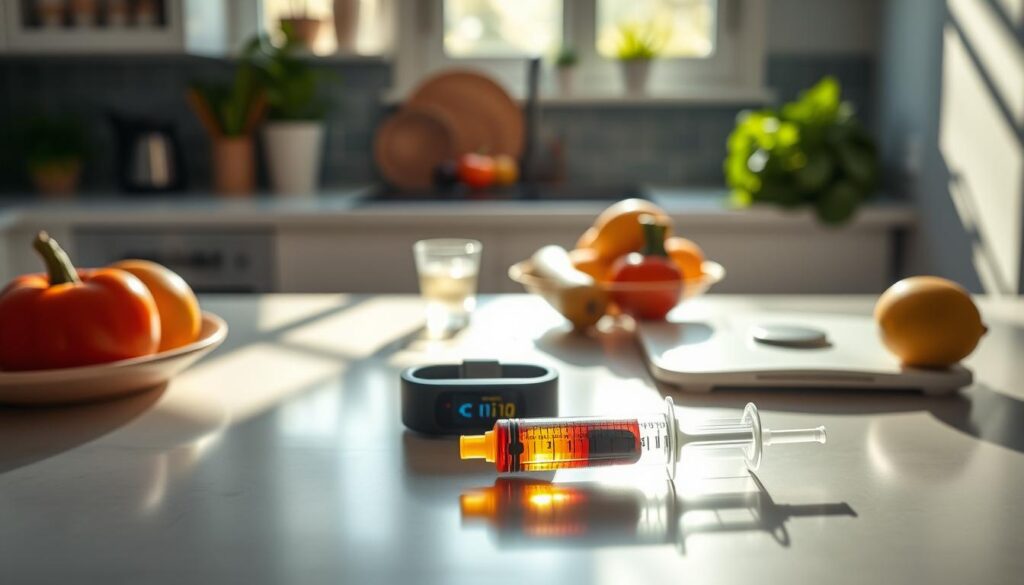A new class of injectable medications is changing how we manage weight. Weight loss shots like semaglutide Wegovy Ozempic and tirzepatide Zepbound Mounjaro are making a big impact.
They are helping people with obesity and excess weight. Let’s look into what these treatments are and how they can help.
Key Takeaways
- Weight loss shots are injectable medications that mimic the GLP-1 hormone suppressing appetite and signaling fullness to the brain.
- These injections have shown significant effectiveness in aiding weight management with some patients experiencing over 20% reduction in excess body weight.
- Semaglutide approved by the FDA in 2021 is the first anti-obesity medication recognized for chronic weight management since 2014.
- Weight loss shots can help boost metabolism increase energy levels, and promote the development of lasting healthy habits.
- Eligibility for these injections typically requires a BMI of 30 or higher, with options for patients with a BMI between 30-40 to combine them with other weight loss strategies.
Understanding Semaglutide and Weight Loss Medications
Semaglutide is a new weight loss drug that’s getting a lot of attention. It works like a hormone in the gut to control blood sugar and insulin. This is key for managing weight.
How GLP-1 Receptor Agonists Work
At higher doses semaglutide affects the brain’s hunger centers. It makes you feel full and less hungry. This is why it’s so effective for losing weight.
FDA Approval and Medical Recognition
In 2021, the FDA approved semaglutide for weight loss. It’s the first drug in years for people who are obese or overweight. This approval has made semaglutide a big deal in the weight loss world.
Different Types of Injectable Medications
There are other injectable GLP-1 RA drugs like Ozempic and Rybelsus. Also, liraglutide Saxenda, Victoza and tirzepatide Zepbound, Mounjaro are approved. They’re given weekly making them easy to use for weight control.
| Medication | Brand Name | Approval | Administration |
|---|---|---|---|
| Semaglutide | Wegovy, Ozempic, Rybelsus | Approved by FDA for weight loss in 2021 | Weekly subcutaneous injection |
| Liraglutide | Saxenda, Victoza | Approved by FDA for weight loss in 2014 | Daily subcutaneous injection |
| Tirzepatide | Zepbound, Mounjaro | Approved by FDA for weight loss in 2022 | Weekly subcutaneous injection |
Knowing how these weight loss drugs work and their approval status helps people choose the best one. This choice is important for their health and weight goals.
The Science Behind Weight Loss Injections
Weight loss injections work by targeting hormones and receptors in the body. Medications like semaglutide and liraglutide activate the GLP-1 receptor. This receptor controls hunger and metabolism.
By activating this receptor, these medications slow down stomach emptying. They also signal the brain to feel full. This reduces hunger and calorie intake.
The latest innovation is dual agonist drugs like tirzepatide. They target both GLP-1 and GIP receptors. This results in more weight loss than single-target medications.
Researchers are now exploring triple agonist drugs. These may target even more hormonal pathways. This could lead to even more weight loss benefits.
These injections also have anti-inflammatory effects. They may help manage conditions like fatty liver disease. As science learns more, these medications could help with weight management and metabolic health.
| Medication | Mechanism of Action | Average Weight Loss |
|---|---|---|
| Semaglutide Wegovy | GLP-1 receptor agonist | 15% of body weight |
| Liraglutide Saxenda | GLP-1 receptor agonist | 8-9% of body weight |
| Tirzepatide Mounjaro | GLP-1 and GIP receptor agonist | 18% of body weight |
Scientific advancements in weight loss injections could greatly help with weight loss fat loss, and healthy lifestyle. They could benefit those struggling with obesity and related health issues.

GLP-1 receptor agonists have been used for almost twenty years in the management of diabetes, showing effectiveness in promoting weight loss and managing diabetes.
Benefits of Weight Loss Shots for Obesity Management
Weight loss injections like those with semaglutide, help a lot with obesity. They work by making you feel less hungry so you eat fewer calories. This can lead to losing 15-20% of your body weight.
These shots do more than just help you lose weight. They also make your body burn fat better and give you more energy. This is good for your health and can even lower the risk of serious diseases like cancer and heart disease.
Appetite Suppression Effects
Weight loss shots work by making you feel full with less food. They affect the hormones that control hunger. This helps you eat less and lose weight in a healthy way.
Metabolic Improvements
These shots also make your body better at burning fat. They increase your energy and help you move more. People taking these shots often feel more active and have more energy.
Long-term Health Benefits
These shots can lead to big health gains over time. They help you keep a healthy weight, which lowers the risk of diseases like diabetes and heart disease. This can make you live longer and healthier.
Weight loss injections have been a game-changer for my patients struggling with obesity. The combination of appetite suppression metabolic enhancements, and long term health benefits is truly remarkable.
– Dr. Sarah Emerson, Obesity Medicine Specialist
What to Know About Weight Loss Shots
Weight loss shots are a new way to help people manage their weight. But, they are not a quick fix. To get the best results you need to use these shots along with a healthy lifestyle. This includes eating well and exercising regularly.
One good thing about weight loss shots is how easy they are to use. You get them once a week, which is simpler than taking pills every day. Some people start to see changes in two weeks, while others might take about eight weeks.
It’s important to keep up with healthy habits even after you stop using the shots. Staying consistent is key to keeping the weight off. A healthy lifestyle should always be the main focus, and shots should just help a bit.
Weight loss shots are a valuable tool, but they work best when combined with a holistic approach to weight loss and healthy lifestyle changes.
Understanding how weight loss shots work and the need for a full approach helps people make better choices. This way they can reach their weight loss goals and live a healthier life.

Read more: Best weight loss programs for women
| Medication | Average Weight Loss | Timeline |
|---|---|---|
| Wegovy | 14.9% of body weight | 68 weeks |
| Ozempic | Up to 14 lbs | 40 weeks |
| Saxenda | 9.2% of body weight or 21 lbs | 56 weeks |
Remember, results can vary. How well you stick to the plan and how your body responds matters a lot. Being consistent and committed to a healthy lifestyle is crucial for lasting weight loss and health.
Effectiveness and Expected Results
Studies have shown that weight loss injections can be very effective. In a study with 2,000 obese adults, half of those using semaglutide lost 15% of their body weight. Almost a third lost 20% after 68 weeks. This is much better than the 2.4% weight loss from just lifestyle changes.
New medications like Zepbound have even better results. Patients can lose up to 20-22% of their extra body weight. This is as good as the results from bariatric surgery. But it’s important to keep using the medication to avoid weight gain.
| Medication | Average Weight Loss | Percentage of Patients Achieving 5% or More Weight Loss | Percentage of Patients Achieving 10% or More Weight Loss |
|---|---|---|---|
| Semaglutide | 15% after 68 weeks | 50% | 30% |
| Zepbound | 20-22% of excess body weight | N/A | N/A |
People with type 2 diabetes might lose less weight. But, the results from these injections are still very promising. They could be a big help in managing obesity and related health issues.
The results from these weight loss injections are truly remarkable offering a potential solution for individuals struggling with obesity and its associated health risks.
Side Effects and Safety Considerations
Weight loss shots like semaglutide and tirzepatide can help with weight loss and fat loss. But, it’s important to know about possible side effects and safety issues. Knowing these can help people make smart choices and handle their treatment well for a healthy lifestyle.
Common Side Effects
Common side effects include nausea, headaches, and feeling tired. Some people might feel dizzy or have stomach problems like diarrhea or bloating. These issues usually go away as the body gets used to the medication.
Risk Factors and Contraindications
Some health conditions might mean you can’t use weight loss shots. This includes a history of certain cancers gallbladder disease or pancreatitis. If you have any of these talk to your doctor before trying weight loss injections.
Managing Potential Complications
Doctors might start with a small dose and increase it slowly. Regular check-ups are key to using these medications safely and effectively. If you experience any side effects, tell your doctor right away. They can adjust your treatment as needed.
| Side Effect | Incidence Rate |
|---|---|
| Nausea | 44% |
| Diarrhea | 30% |
| Vomiting | 24% |
| Constipation | 24% |
| Stomach-area pain | 20% |
| Feeling bloated | 7% |
| Heartburn | 5% |
| Belching or gas | 6% |

While side effects are a concern the benefits of weight loss shots often outweigh the risks. Working closely with a healthcare provider can help manage side effects. This way, patients can get the most out of their treatment for a healthy weight and improved health outcomes.
Eligibility Criteria for Weight Loss Injections
Weight loss injections, like Wegovy and Ozempic help people manage their weight. But they’re not for everyone. To get these injections, you must meet certain criteria.
First, you need a body mass index BMI of 30 or more. This means you’re clinically obese. If your BMI is between 27 and 30, and you have health issues like high blood pressure or diabetes you might qualify too.
Before starting, talk to your doctor about your health history. They’ll check if you’re a good candidate for these injections. Some clinics might ask for recent lab results to confirm your eligibility.
However, some people can’t get these injections. This includes those with a history of certain cancers endocrine disorders, pancreatitis or who are pregnant or breastfeeding. You must also be at least 12 years old to receive them.
| Eligibility Criteria | Requirements |
|---|---|
| Body Mass Index BMI | 30 or higher or 27 or higher with at least one weight-related health condition |
| Medical History |
|
| Age | 12 years or older |
Healthcare providers look at your medical history and current health to decide if injections are right for you.
Cost and Insurance Coverage
Weight loss injections can be very expensive. Some drugs for weight loss can cost over $1,300 a month, even with insurance. This makes them hard for many to afford.
Getting insurance to cover these drugs can be tough. Medicare can’t cover weight loss meds. Some employers also don’t include GLP-1 drugs in their health plans.
Even with insurance, there are strict rules. Insurers often need to approve the treatment first. They only cover it if you have a health problem like diabetes or heart disease.
If insurance says no you can appeal. But dealing with the healthcare system can be hard. Many people don’t know how to fight for their coverage.
The Cost of Weight Loss Shots
Wegovy a popular weight loss shot, costs about $1,300 a month. In 2021 sales of semaglutide meds hit $10.7 billion. Prescriptions for these drugs jumped 300% from 2020 to 2022.
Insurance Requirements and Coverage Options
More people want weight loss injections, but insurance is a big problem. Studies show about two-thirds of patients stop using GLP-1 agonists within a year. This is often because of the high costs.
The Treat and Reduce Obesity Act of 2023 wants to help. It aims to cover weight loss meds under Medicare and Medicaid. Until then patients might look into patient assistance programs to help pay for these treatments.

Read more:Lose Weight with This Meal Plan for Weight Loss
Treatment Protocol and Administration
Weight loss shots involve weekly injections under the skin. You can get these at a clinic or use take-home kits. First you’ll have a consultation to talk about your goals and fitness.
Then, you’ll get a month’s worth of medication. You’ll also have monthly check-ups. These help your healthcare team see how you’re doing and adjust your treatment if needed. How long you’ll need treatment depends on your progress and how well you respond to the medication.
- Subcutaneous self-injections, typically once a week
- Initial consultation to assess goals and fitness levels
- Monthly supply of medication
- Monthly check-ups to monitor progress and adjust treatment
- Treatment duration varies based on individual needs and response
Research indicates that adults who use prescription medications as part of a lifestyle program lose between 3% to 12% more of their starting body weight compared to those who don’t take medication.
Weight loss shots are easy to get and convenient. They’re great for people trying to lose weight and eat healthier. By sticking to the treatment plan and working with your healthcare team, you can reach your goals.
Combining Injections with Lifestyle Changes
Weight loss injections, like semaglutide, work best with lasting lifestyle changes. Patients get a diet and exercise plan tailored to their needs. This helps them on their weight loss journey.
Diet and Exercise Requirements
Healthcare providers suggest a diet low in calories but rich in nutrients. They also recommend regular exercise. Drinking at least 80 ounces of water a day and eating high-protein foods are key. Plus, doing 20-30 minutes of aerobic activity daily is important.
These habits make the weight loss injections more effective. They also help keep the weight off for good.
Long-term Maintenance Strategies
Keeping weight off after stopping injections is key. Patients work with their healthcare team to build lasting habits. This includes eating healthy and staying active.
Regular check-ups help patients stay on track. They ensure the weight loss continues even after treatment ends.
| Key Statistics | Average Results |
|---|---|
| Weekly Weight Loss | 1-2 pounds |
| Typical BMI Requirement | 27 or higher |
| Total Body Weight Loss | Up to 20% |
Combining weight loss injections with a lifestyle plan leads to lasting weight loss and fat loss. It also improves overall healthy lifestyle. This approach is vital for managing obesity and related health issues long-term.

The team at Med Spa At Seena One, in collaboration with Southwest GI Clinic, monitors patients’ progress, offers personalized guidance, and adjusts treatment plans as needed.
Latest Developments in Weight Loss Shots
The obesity problem in the United States is getting worse. Researchers are working hard to find better ways to lose weight. They are making progress, offering hope for those who struggle to lose weight and improve their health.
One exciting new area is triple agonist drugs. These drugs work on several hormone receptors. They help control hunger, metabolism, and fat storage. Early tests show they could lead to more weight loss than current shots like Ozempic and Mounjaro.
Scientists are also looking into how to keep muscle while losing weight. A drug called azelaprag might help keep muscle when used with Zepbound. This could be a big help for people worried about losing muscle while trying to lose weight.
More research is also looking into the anti-inflammatory effects of these drugs. They might help with fatty liver disease and improve outcomes in surgeries. Excess weight can make surgeries harder and increase risks.
These new developments in weight loss medications are promising. They aim to tackle weight loss from different angles including hormone regulation and muscle preservation. This research could lead to better, more effective ways to lose weight and improve health in the future.
| Medication | Average Weight Loss | Cost |
|---|---|---|
| Ozempic | 15-20% | $1,200/month |
| Mounjaro | 17% | $1,300/month |
| Zepbound | 12-18% | $1,100/month |
The high cost of these medications is a big issue. But, the benefits they offer in weight loss and health are significant. As research goes on, we might see more affordable options. This could help more people find effective ways to lose weight.
Conclusion
Weight loss injections are a big step forward in fighting obesity. They offer a way to lose weight without surgery. Medicines like Wegovy and Ozempic have helped many people lose a lot of weight.
But, these injections are just one part of the solution. They work best when you also change your lifestyle. This means eating better and moving more.
As scientists keep studying, we’ll see even better ways to lose weight. This will help people with too much weight to get healthier. If you’re thinking about weight loss injections, talk to your doctor first.
Managing weight is all about using many different methods. This includes eating right, exercising more, and using medicines like Wegovy. By using a complete approach, you can make lasting changes and live a better life.
FAQ
What are weight loss shots?
How do GLP-1 receptor agonists work for weight loss?
What are the different types of weight loss injections?
What are the benefits of weight loss shots?
How effective are weight loss shots?
What are the side effects and safety considerations?
Who is eligible for weight loss injections?
How much do weight loss shots cost, and are they covered by insurance?
What are weight loss shots?
How do GLP-1 receptor agonists work for weight loss?
What are the different types of weight loss injections?
What are the benefits of weight loss shots?
How effective are weight loss shots?
What are the side effects and safety considerations?
Who is eligible for weight loss injections?
How much do weight loss shots cost, and are they covered by insurance?
FAQ
What are weight loss shots?
Weight loss shots are injectable medications like semaglutide Wegovy Ozempic and tirzepatide Zepbound, Mounjaro. They help manage weight. These drugs were first used for diabetes but work well for losing weight too.
How do GLP-1 receptor agonists work for weight loss?
These medications mimic the GLP-1 hormone. This hormone tells the brain you’re full. It also slows down how fast food leaves your stomach, making you feel less hungry.
What are the different types of weight loss injections?
The FDA has approved Wegovy, Ozempic, and Rybelsus for semaglutide. Tirzepatide is approved in Zepbound and Mounjaro. Liraglutide is found in Saxenda and Victoza.
What are the benefits of weight loss shots?
Weight loss shots help you eat less by reducing hunger. They also burn fat better and give you more energy. They can lower the risk of serious diseases like cancer and heart disease over time.
How effective are weight loss shots?
Studies show weight loss shots can lead to losing 15-20% of body weight. But, if you stop taking them, you might gain back the weight.
What are the side effects and safety considerations?
Side effects include nausea headaches, and stomach problems. They’re not safe for everyone, especially those with certain cancers or pancreatitis.
Who is eligible for weight loss injections?
They’re for people with a BMI of 30 or higher. Or those with a BMI of 27 or higher and a weight-related condition.
How much do weight loss shots cost, and are they covered by insurance?
Without insurance they can cost about
FAQ
What are weight loss shots?
Weight loss shots are injectable medications like semaglutide Wegovy, Ozempic and tirzepatide Zepbound, Mounjaro. They help manage weight. These drugs were first used for diabetes but work well for losing weight too.
How do GLP-1 receptor agonists work for weight loss?
These medications mimic the GLP-1 hormone. This hormone tells the brain you’re full. It also slows down how fast food leaves your stomach making you feel less hungry.
What are the different types of weight loss injections?
The FDA has approved Wegovy Ozempic, and Rybelsus for semaglutide. Tirzepatide is approved in Zepbound and Mounjaro. Liraglutide is found in Saxenda and Victoza.
What are the benefits of weight loss shots?
Weight loss shots help you eat less by reducing hunger. They also burn fat better and give you more energy. They can lower the risk of serious diseases like cancer and heart disease over time.
How effective are weight loss shots?
Studies show weight loss shots can lead to losing 15-20% of body weight. But, if you stop taking them, you might gain back the weight.
What are the side effects and safety considerations?
Side effects include nausea, headaches, and stomach problems. They’re not safe for everyone, especially those with certain cancers or pancreatitis.
Who is eligible for weight loss injections?
They’re for people with a BMI of 30 or higher. Or those with a BMI of 27 or higher and a weight-related condition.
How much do weight loss shots cost, and are they covered by insurance?
Without insurance, they can cost about $1,200 a month. Insurance often doesn’t cover them for weight loss alone. You need to have diabetes or other conditions.
How are weight loss shots administered?
You get them weekly by injecting yourself. You can go to a clinic or use a kit to do it at home.
How important are lifestyle changes when using weight loss shots?
Lifestyle changes are key. Eating right and exercising are crucial. Keeping up these habits is important even after stopping the shots.
What are the latest developments in weight loss medications?
New medications are being made. They target more hormone receptors for better results. A triple agonist is in trials and looks promising.
,200 a month. Insurance often doesn’t cover them for weight loss alone. You need to have diabetes or other conditions.
How are weight loss shots administered?
You get them weekly by injecting yourself. You can go to a clinic or use a kit to do it at home.
How important are lifestyle changes when using weight loss shots?
Lifestyle changes are key. Eating right and exercising are crucial. Keeping up these habits is important even after stopping the shots.
What are the latest developments in weight loss medications?
New medications are being made. They target more hormone receptors for better results. A triple agonist is in trials and looks promising.





